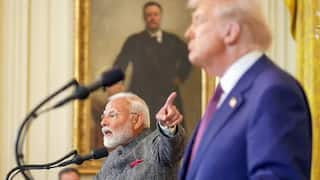In Brazil's Sao Paulo, Wildfires Devour Farmland, Cloak Cities In Smoke — WATCH
Brazil’s wildfire season usually occurs in August and September. However, this year, wildfires began unusually early in Pantanal, the world’s largest wetlands, in late May.

Wildfires in Brazil's Sao Paulo state are closing in on 30 of its cities, said local authorities. In a statement, the state government said the cities have been affected by dry, hot weather in recent days, and warned that forest fires could spread rapidly due to the wind, razing natural vegetation, Reuters reported.
The world’s largest sugarcane processor, Raizen, said operations at one of its plants in Sertaozinho had been halted since Thursday due to fires in sugarcane fields.
Fires have engulfed numerous cities in #Brazil’s Sao Paulo state, devouring farmland and cloaking cities under smoke.
— DD India (@DDIndialive) August 25, 2024
A total of 17 cities are currently battling active wildfires, while 36 cities are under maximum alert due to an ongoing drought and heatwave.
Local media… pic.twitter.com/URyPRolJTp
The Sao Paulo state government has created an emergency committee to address the issue. The authorities have also blocked around 15 highways either fully or partially. A report by Reuters said two people had died in an industrial plant while trying to hold back the flames.
Brazil’s wildfire season usually occurs in August and September. However, this year, wildfires began unusually early in Pantanal, the world’s largest wetlands, in late May. Meanwhile, the number of fires in the Amazon rainforest rose to a two-decade high for the month of July, Reuters reported, citing government data.
Sao Paulo Governor Tarcisio de Freitas wrote on X, "We currently have 30 cities on high alert for large fires and we are working to control the situation and ensure safety."
In a separate post, he added: "Sao Paulo is facing a difficult time and we are committed, joining forces, to control the fires and keep people safe.
"We were in the field throughout the day to ensure a prompt response to the most affected areas, such as Piracicaba, Barrinha, Sertaozinho and Ribeirao Preto. We will not rest until the situation is back to normal."





































